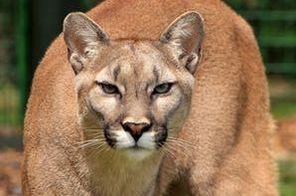
Cougar
By Laura Allard and Dr. Frey
Biology and Identification
Cougars (Puma concolor) are North America’s largest “big cat”, and second largest cat of the Americas behind the Jaguar. Cougars have many common names such as Mountain Lion, Puma, and Catamount to name a few. Their coloration is tan or tawny, and blonde or white on the underbelly. The Cougar’s eyes are yellow with black eyelid skin, giving the appearance of “eyeliner”. The size range of most Cougars is between 90-200lbs. Kittens have different coat patterns than adults; with black spots scattered over the tawny coloration for better camouflage. Unlike the African Lion, these “Mountain Lions” are solitary animals, only meeting others for purposes of mating or vying for territory.
Cougars are strictly carnivorous creatures, eating mainly Mule Deer in Utah, but occasionally take down Elk, Antelope, Bighorn Sheep, and smaller mammals, birds and reptiles. Cougars typically hunt at dusk or in the early morning when Mule Deer move from area to area.
Habitat
In Utah, the Cougar prefers the high desert type terrain with juniper trees, sagebrush, pine or oak trees, and rocky cliffs where they can easily find cover for hunting.
Cougars are wary and solitary animals, and as such rarely take up close residence to humans. Regardless of this however, Cougars will follow sources of food like Mule Deer, and may find their way into rural areas occasionally.
Conflicts
Just like with most apex predators, the Cougar has created a negative image for itself based on its hunting habits and rare occurrences of negative human contact. Many residents of areas near populations of Cougars fear or even hate the Cougar, believing it has malintentions towards their livestock or themselves as humans. This is unfortunate, as Cougar’s habitats are increasingly being broken up which may lead to decline in the specie’s numbers.
How to Prevent Conflict with a Cougar
Although it is very unlikely you will ever meet a cougar face to face, here are some tips to help yourself if it does happen.
Report any aggressive wildlife or animal encounters to Utah’s Division of Wildlife Resources or to your local law enforcement so that they may relocate the animal to keep others safe.
References
http://www.wildawareutah.org/utah-wildlife-information/cougars/cougar-facts/
http://www.wildawareutah.org/utah-wildlife-information/cougars/
https://en.wikipedia.org/wiki/Cougar
By Laura Allard and Dr. Frey
Biology and Identification
Cougars (Puma concolor) are North America’s largest “big cat”, and second largest cat of the Americas behind the Jaguar. Cougars have many common names such as Mountain Lion, Puma, and Catamount to name a few. Their coloration is tan or tawny, and blonde or white on the underbelly. The Cougar’s eyes are yellow with black eyelid skin, giving the appearance of “eyeliner”. The size range of most Cougars is between 90-200lbs. Kittens have different coat patterns than adults; with black spots scattered over the tawny coloration for better camouflage. Unlike the African Lion, these “Mountain Lions” are solitary animals, only meeting others for purposes of mating or vying for territory.
Cougars are strictly carnivorous creatures, eating mainly Mule Deer in Utah, but occasionally take down Elk, Antelope, Bighorn Sheep, and smaller mammals, birds and reptiles. Cougars typically hunt at dusk or in the early morning when Mule Deer move from area to area.
Habitat
In Utah, the Cougar prefers the high desert type terrain with juniper trees, sagebrush, pine or oak trees, and rocky cliffs where they can easily find cover for hunting.
Cougars are wary and solitary animals, and as such rarely take up close residence to humans. Regardless of this however, Cougars will follow sources of food like Mule Deer, and may find their way into rural areas occasionally.
Conflicts
Just like with most apex predators, the Cougar has created a negative image for itself based on its hunting habits and rare occurrences of negative human contact. Many residents of areas near populations of Cougars fear or even hate the Cougar, believing it has malintentions towards their livestock or themselves as humans. This is unfortunate, as Cougar’s habitats are increasingly being broken up which may lead to decline in the specie’s numbers.
How to Prevent Conflict with a Cougar
- Do not hike, walk, or jog alone. Cougars are much less likely to attack people in groups. Cougars don’t like taking on more than one foe at a time, so groups are much safer from Cougar attack. Further, the noise from the group is likely to scare the Cougar off before you get too close.
- Secure pets and livestock indoors at night.
- Reduce possible hiding places for wildlife.
- Remove dead animals, old food, pet food, etc from property regularly. This will prevent attraction of food sources for the Cougar into your property.
Although it is very unlikely you will ever meet a cougar face to face, here are some tips to help yourself if it does happen.
- Do NOT run. Running will activate the Cougar’s hunting instincts. Rather, stay where you are or make slow movements.
- Make yourself look larger. A Cougar is less likely to attack something larger than itself. Avoid crouching, laying, squatting, etc.
- Keep children and small pets near you. Again, Cougars attack prey smaller than them, so keep them closer to you.
- Speak loudly and firmly. Cougars do not like having the lower hand, or losing the element of surprise. Letting the Cougar know you are there may help prevent an attack.
- Back away slowly and leave. Sudden movements are bad, but don’t stay near the animal and further agitate it. Leave slowly and calmly while keeping yourself looking large.
- IF you are attacked, fight back! Cougars like easy prey. If you hit, scratch, bite, stab, etc. back at it, it will probably flee from you. Always keep your head and neck protected if attacked.
Report any aggressive wildlife or animal encounters to Utah’s Division of Wildlife Resources or to your local law enforcement so that they may relocate the animal to keep others safe.
References
http://www.wildawareutah.org/utah-wildlife-information/cougars/cougar-facts/
http://www.wildawareutah.org/utah-wildlife-information/cougars/
https://en.wikipedia.org/wiki/Cougar
